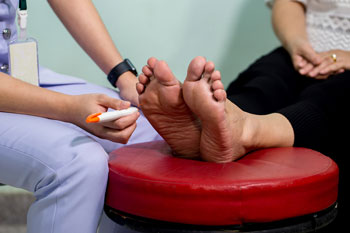






Diabetics should pay particular attention to their feet on a daily basis. Diabetics should inspect their feet daily to ensure there are no cuts or bruises or other abnormalities. Nails should be properly trimmed so as not to cause any cuts to the adjacent toes. Diabetics should make sure their shoes are properly fitting and lined with a cushioned padding to help prevent irritation, and wounds. Control of glucose (blood sugar) is of the most importance. Long-term diabetics are at higher risk of developing peripheral neuropathy or nerve damage. To help diagnose and treat neuropathy, we often perform a small skin biopsy to measure the quality and quantity of the nerves thereby grading the prognosis of peripheral neuropathy. Neuropathy and nerve pain are discussed in other area of this website.
Blisters may be noted in diabetic patients due to inherent lack of healing and irritation from their footwear. These abrasions and cuts may become infected. It is imperative that diabetic wound patients immediately present to the office for medical care. It is common for our office to fabricate custom orthotics specifically designed for diabetics and/or to order diabetic approved shoes which prevent irritation which may occur from normal shoe gear. Most often, these treatments are covered by insurance.
Our office provides diabetic foot ulcer and wound care. We may treat the wound with special enzyme ointments as well as application of grafts to promote healing. Some grafts contain growth factor proteins to promote healing. Sometimes surgery requires debridement with a medical grade pressure washer or debrider which helps to remove bad tissue and promote healing. We use special dressings, sometimes impregnated with silver or honey to promote healing. If someone you know has diabetic foot problems, please refer them to our office.
Written by Richard T. Braver, DPM, FACFAS






